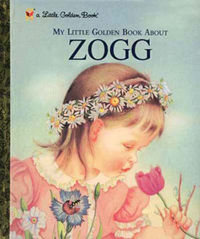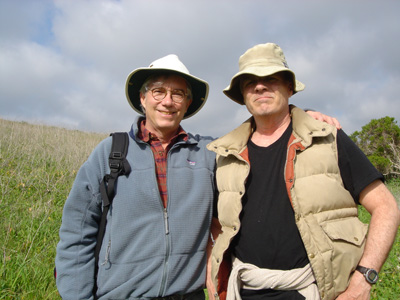
A cartoonist named Jason Yungbluth has doctored My Little Golden Book about God to make a weird and very funny alien-invasion pamphlet called The Book of Zogg. Yungbluth hits all these great classic SF power-chords. (Thanks to Richard Kadrey for the link.)
I wrote something similar to Book of Zogg inside of Master of Space and Time, where I had some Heinlein's Puppet Master spine-riding parasitic leeches that have created a religion of sorts based on submitting to alien control. I ahd this detailed description of a tract about the religion's teachings. When I wrote that novel, I was living in Jerry Falwell's Lynchburg, VA, and reacting to that.
***
I've always felt comfortable with the idea of the Cosmic One being God, and that you can somehow get strength from this notion, although the seeming response could be either a self-exciting circuit of the brain, or a social network, rather than some higher being responding to you.
I picked up a book of the ten Zen ox-herding pictures today in Cruz, from 1200 AD. God everywhere, God nowhere, what's the problem? After the guy finds the ox [God], the ox disappears, and then the guy disappears and the picture is blank.
***
Picture of me and God in the form of Jon Pearce in Cruz today. “In his heart the fool hath said there is no Jon Pearce.” Mathcs 7.3.

***
Here's an excerpt, kind of relevant, from The Lifebox, the Seashell, and the Soul.
***
If I say that everything is a computation, I’m saying that everything is a deterministic process. And that means that reality is a weave of logical if-then statements, with each phenomenon linked to a cause.
As an extreme example of universal automatism, Wolfram suggests that if we trace the world’s computations all the way back, there may be some underlying supercomputation that generates not only the entire cosmos but also the underlying fabric of space and time.
But then, of course, we’d have to ask why that particular supercomputation exists.
This leads to what is sometimes called the superultimate why question, “Why is there anything?” The question is inherently unanswerable, for no proposed solution can be enough.
Given that the superultimate why question is impossible to answer, it’s in some sense meaningless — but such a criticism doesn’t remove the question’s sting. The question can never be answered, yet it is not emotionally meaningless.
Even if Wolfram were right, it doesn’t seem as if knowing the world to be the result of some supercomputation would be of much use to us. We still wouldn’t know where the supercomputation came from. And — perhaps even more importantly, we still wouldn’t know what it’s for.
And that, after all, is really what we’re after when we ask about the meaning of life. It’s not so much the cause that’s puzzles us as the purpose. Does a person’s life have a purpose?
Well, our studies of universal automatism do suggest one line of thought. Computationally rich class four behaviors are in an objective sense more interesting than those that die out, repeat, or have no discernible structure. So a universal automatist might say that the meaning and purpose of a human life is to produce gnarly or “class four” computation.

The notion of gnarly computation as the meaning of life fits in with the more humanistic world views.
The human artifacts we admire are computationally rich. An empty canvas is class one. Hack artwork is class two copying of existing artifacts. Ugly scuzz is class three. Great art is class four.
The nobler emotions are computationally rich as well. Murderous rage forces some victim’s computation into class one termination. Hatred throws the hater into a class two loop. Too needy a desire to please puts a person at the mercy of capricious class three inputs. Compassion is an ever-evolving class four process.
Get the picture?
The meaning of life is beauty and love.
***
Back to God, there's a lot of force in the old saying, “God is Love.”

Isn't this a great cone shell? I took this picture today.
***
A reader (r.s.) writes in that he sat at the same table as I photographed, in L. G. Coffee Roasting today. Cool. In my Silicon Valley SF novel Spaceland a hole in reality forms just a few feet from that table during a climactic scene!









February 10th, 2005 at 8:27 am
This is a rich post. It brings up a lot of questions. One of these issues I think you are pointing at is survivability. Maybe the integral of complexity over time, which might be a good definition of survivability, is Our measure of value? At least, we humans might think so.
I have some ill formed questions about these computations, and I fear my mathematical sophistication may not be up to the task. I hope that these will be answered in references in your book or in your book. My understanding is that these are finite computations. The idea is somehow to generate all of the phenomena of the universe via these finite computations, thereby avoiding the messy problem of infinity, by identifying a generating function for the universe. My intuition tells me that one problem will be that this function will not be unique – hmm its starting to sound like string theory. OTOH, the spectrum of a finite thing in time has an infinite representation in some dual space. Does this reintroduce the problem of infinity even when one tries to bound it via a finite generator? Anyway, I suspect that you have thought about these things much more deeply than I. I am looking forward to your books arrival.